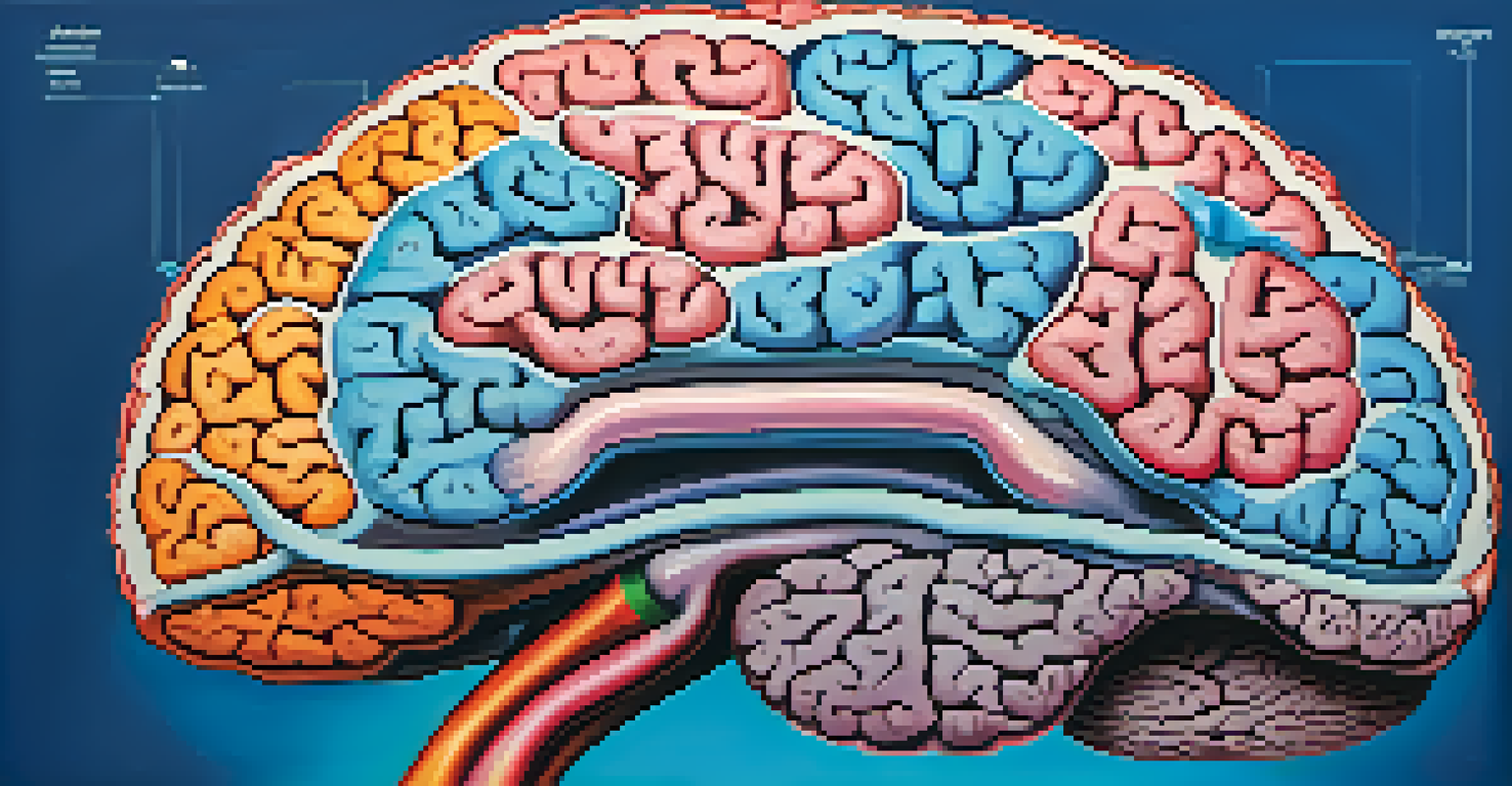Understanding How Sleep Architecture Affects Mental Clarity

What is Sleep Architecture and Why It Matters
Sleep architecture refers to the structure and pattern of sleep cycles throughout the night. It includes various stages like REM (Rapid Eye Movement) and NREM (Non-Rapid Eye Movement) sleep, each playing unique roles in our physical and mental health. Understanding this architecture is crucial because it directly affects how rested and clear-headed we feel during the day.
Sleep is the best meditation.
Imagine sleep as a well-orchestrated symphony, where each instrument represents a different sleep stage. If one section is out of tune, the entire performance suffers. Similarly, if your sleep architecture is disrupted, it can lead to issues with focus, memory, and overall cognitive function.
By recognizing the importance of sleep architecture, we can better appreciate how our nightly rest impacts our waking life. A good night's sleep isn't just about quantity; it's about the quality and structure of that sleep.
The Stages of Sleep and Their Functions
Sleep is divided into several stages, primarily REM and NREM, each serving distinct functions. NREM sleep, which includes stages 1, 2, and 3, is essential for physical restoration and memory consolidation. Meanwhile, REM sleep plays a crucial role in emotional regulation and creativity.

Think of NREM sleep as a repair shop for your brain and body, where the heavy lifting of restoration takes place. In contrast, REM sleep can be seen as a creative workshop, where your mind processes emotions and dreams. Together, they form a complete cycle that nourishes both body and mind.
Sleep Architecture Affects Clarity
The structure of our sleep cycles, including REM and NREM stages, directly influences our mental clarity and cognitive function.
Understanding these stages can help individuals prioritize their sleep habits. For instance, ensuring you reach sufficient REM sleep can enhance your mental clarity and emotional resilience in daily life.
How Sleep Disruptions Impact Mental Clarity
Disruptions to sleep architecture, such as insomnia or sleep apnea, can significantly impair mental clarity. When we don’t cycle through the necessary sleep stages, we may wake up feeling groggy or unfocused. This can affect everything from decision-making to problem-solving abilities.
A good laugh and a long sleep are the best cures in the doctor’s book.
Consider how a missed train can derail your entire journey; similarly, a lack of quality sleep can throw off your cognitive train of thought. Missing out on critical stages like REM can lead to foggy thinking and decreased productivity.
Recognizing how these disruptions affect us can motivate changes in our sleep hygiene. Simple adjustments, like maintaining a consistent sleep schedule or creating a calming bedtime routine, can lead to better mental clarity.
Sleep Architecture and Memory Consolidation
Memory consolidation occurs during sleep, particularly during NREM and REM stages. This process transforms short-term memories into long-term ones, reinforcing learning and retention. If our sleep architecture is disrupted, this vital function is compromised, leading to forgetfulness or difficulty recalling information.
Think of your brain as a filing cabinet; when you sleep well, files are neatly organized. However, if you don’t get proper sleep, those files become jumbled and harder to find. Poor sleep architecture can lead to messy mental organization, making it challenging to perform at your best.
Sleep Quality Impacts Mood
Disrupted sleep architecture can lead to emotional instability, increasing irritability, anxiety, and depression.
Improving sleep quality can enhance our memory. Techniques such as limiting screen time before bed or engaging in relaxation practices can help us achieve the restorative sleep we need.
The Link Between Sleep Quality and Mood
Quality sleep is closely linked to our emotional well-being and mood stability. Disrupted sleep architecture can lead to irritability, anxiety, and even depression. When we fail to get restorative sleep, our capacity to manage emotions and stress diminishes.
Imagine trying to build a house on a shaky foundation; similarly, poor sleep creates an unstable emotional base. When you wake up feeling unrested, you’re more likely to react negatively to stressors throughout the day.
By prioritizing quality sleep, we can promote a more positive mood and better emotional health. Simple changes, such as creating a peaceful sleep environment, can make a world of difference.
Strategies to Improve Sleep Architecture
Improving sleep architecture involves adopting healthy sleep habits that support all stages of sleep. This includes establishing a consistent bedtime routine, reducing caffeine intake, and creating a comfortable sleep environment. Such strategies can help you maximize the restorative benefits of sleep.
Think of your body as a garden that needs watering and care. Just as plants thrive with proper attention, your sleep will flourish with mindful practices. Simple adjustments can yield significant improvements in your sleep quality.
Naps Enhance Focus and Performance
Short naps can provide a quick mental refresh, improving focus and performance when timed appropriately.
By implementing these strategies, you’ll set yourself up for better mental clarity and well-being. Remember, small changes can lead to big results!
The Role of Naps in Enhancing Mental Clarity
Napping can be a powerful tool for enhancing mental clarity, especially when you're feeling sleep-deprived. Short naps can help refresh your mind and improve focus, providing a quick boost without the grogginess that sometimes accompanies longer sleep sessions. However, timing and duration are key for maximizing their benefits.
Think of a nap as a quick recharge for your phone; it gives you just enough power to continue your day. A 20-minute nap can enhance alertness and performance, while longer naps might lead to sleep inertia, leaving you feeling drowsy.

Incorporating strategic naps into your routine can complement your nighttime sleep, especially during busy or stressful periods. Just be mindful of how and when you nap to ensure they enhance, rather than hinder, your overall sleep architecture.